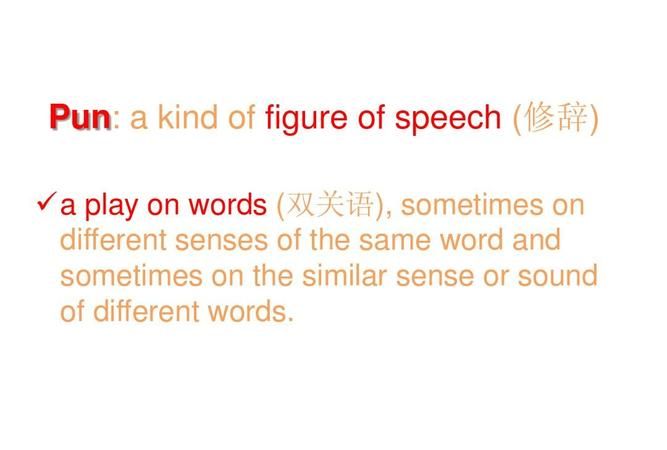本文目录
英语中有哪些超级无敌有趣的双关语言
请看下面一张图片(图中是指Trump Care),你领会到其中的双关语了吗?
双关语,英文是pun,是英语中常见的修辞格之一。这种修辞被广泛应用于文学作品,影视作品以及日常生活中。 双关语在特定语言环境中的使用,不仅极大地丰富了语言的色彩,使得表达更加幽默与风趣,也起到弦外有声、话中有话的修辞效果,给人留下深刻印象。如果语言学习者可以领悟到英语中双关语的妙用,岂不是又增添了学习的一大乐趣?
双关语(pun)在Longman Dictionary of Contemporary English 中的定义是: An amusing use of a word or phrase that has two meanings, or of words that have the same sound but different meanings. 由此可知,双关语其实包含两层含义,表面意义与深层意义,具有言在此而意在彼的特点,耐人寻味。
双关语大致可以分为以下两类:词义双关与谐音双关。
所谓词义双关,就是利用英语词汇的一词多义特点,使之在特定语境下产生特殊的语言双关。
例如:
①A: What's the longest sentence in the world?
B: Life sentence.
其中的"sentence"一词就巧妙地利用了单词的同音同形异义,既可以指“句子”,又可以指“刑期”。所以,这个对话可以翻译为:
A: 世界上最长的句子是什么?
B: 无期徒刑。
这个答案是不是听起来很意外?仔细揣摩,待慢慢回味过来,让人忍俊不禁。文字游戏就是这么有趣。
②在美国高速公路的交通警示牌上会看到这样一句话: Better late than the late.
其中的“late”既包含"迟到"的意思,又有“已故”含义,比如: late wife就是指“已故的妻子”。警示牌借用了谚语“better late than never”做了巧妙替换,后又利用了“late”的一词多义,让人印象深刻,过目不忘。
谐音双关就是利用单词发音相同或者相近的特点而构成的语义相关。这样的英文词汇有:weak和week, deer 和dear, knew和new, in和inn, meet和meat等等。
例如:
①Seven days without water makes one weak(week).
这句话可以解释为:七天不喝水,使人软弱无力,然而七天又刚好是一个星期。这句话就是利用了weak和week同音造成歧义,读来别有一番趣味。
② A bicycle can't stand on its own because it is two-tyred(too tired).
这句话可以解释为是:自行车站不起来,是因为它只有两个轮胎(two-tyred)。而two-tyred和too tired同音,所以也可以说它太累了。
怎么样?双关语是不是很有趣呢。
其实,pun在英语母语者中使用频率还是比较高的。我们在英语学习中可以有意识地多关注这些修辞的妙用,学会欣赏并体会语言的美妙表达,让自己英文学习之旅充满趣味。另外,大家也可以自己尝试制造一些punchlines,努力成为一个punster。
最后,给大家看两个双关语应用的场景,你是否能够get到点呢?
①(在照相馆中,一位妇女问摄影师)
Madam: I look nice in the picture. don't I?
Photographer: Well, Madam, the answer lies in the negative.
② (一位客人在饭馆吃饭)
Waitress: You are not eating your fish. Anything wrong with it?
Customer: Long time no sea.
文献参考:
①《小议英语中的双关语》
②《谈论双关语在英语教学中的汉译原则》

经典英语双关语广告
双关语是一种“文字游戏”(a play on words),就是用一个词表达两种或多种含义,或是几个单词连起来读时,构成了与另一个意思相同或相似的发音,以达到幽默的效果。英文里,双关语翻译为pun,它的使用也很频繁,是英语中常见的修辞格之一。

病人和耐心,一词两义
My brain has two parts. The left one has nothing right and the right one has nothing left.“我的大脑有两部分,左边没什么东西是对的,右边没什么东西。”此处是right一词两义(正确的、右边)和left(左边、剩下的)。

box一词两义(拳击和盒子)
英语双关语的分类
一、英语双关语的分类主要有语音双关和语义双关。
二、语音双关:
1、同音双关
在现代英语词C中,同音异义词数量很大,为双关表达提供了大量的原始素材。同音异义词发音一样,拼写和词义不同因此常被巧妙地运用,形成双关。
2、近音双关
近音双关指的是两个词或短语的发音相似,意思不同,给听者或读者带来明确的联想造成一语双关。
三、语义双关:
1、同形异义词
语义双关以同形异义词为最常见,它是通过同形词来体现语义的双重含义。
2、同形异义短语
英语中的习语大多不能按其字面组成词的意思来解释,而是具有作为习语特定的含义,因此许多习语也成为语义双关的一种来源。

扩展资料:
一、英语双关语(pun)指在一定的语言环境中,利用词的多义和同音的条件,有意使语句具有双重意义,言在此而意在彼的修辞方式。双关可使语言表达得含蓄、幽默,而且能加深语意,给人以深刻印象。
二、主要特点
1、谐音双关和语义双关都是一语关顾表里两层含义,其中蕴含着的不直接说出来的含义是表意所在,既要含而不露,又要使人体会得到,寻味得出,不能造成误会或歧义。
2、要注意双关内容的思想性,不要单纯追求风趣和含蓄。用双关构成歇后语时,尤应注意体现思想积极、健康。
三、语义双关和借喻不同:
1、借喻是以喻体代本体,说的是喻体,要表达的是本体事物,是比喻与被比喻的关系,目的在于使抽象深奥的事物表达得具体、生动、简洁。
2、语义双关表达的是两种意思,借一个词语或句子的意义关顾两个事物,表里意思不一,目的在于收到含蓄委婉、幽默风趣的效果。
英语双关语句子
话说英语的双关(ENGLISH PUN)
双关语(pun)英语中一种常见的修辞手法.该修辞格巧妙利用词的谐音、词的多义或歧义等,使同一句话可同时表达不同意义,以造成语言生动活泼、幽默诙谐或嘲弄讥讽的修辞效果,使人读来忍俊不禁、英语中双关语的构成通常需要两个基本条件,即双重情境(double context)和多义词或同音异义词.其构成方式主要有以下四种:
1)同音异义双关(谐音双关)
指在一个语境中巧妙运用两个或多个词语的同音或谐音达到讽刺或具诙谐意味的效果.
eg1. Seven days without water makes one weak.
七天不进水,人就会虚弱.
weak和week是同音异义词.因此这句话听起来可以理解为:Seven days without water makes one week.
eg2. You earn your living and you urn your dead.
生前劳碌奔命,死后化灰入土.
earn与urn(火化)同音异义,用在一起显得俏皮,别有趣味.
2)同词异义双关(多义词双关)
指在同一语境中运用一个词语的两种意思巧妙地达到幽默风趣的效果,使读之别有韵味.
eg1. A: What's the longest sentence in the world?
世上最长的句子是什么?
B: Prison for life. 无期徒刑.
sentence既有“句子”的意思,也有“刑期”的含义.
eg2. Women have a wonderful sense of right and wrong, but little sense of right and left.
女性对善恶感觉惊人,而对左右感觉麻木.
该句借用同词异义双关讽刺女性方向感差,开车左右不分.
eg3.We must all hang together, or we shall all hang se-parately. 我们必须团结一致,否则将一一被绞死.
本句运用多义双关,深刻而幽默地说明了不团结便灭亡的道理.短语动词hang together作“团结一致”解,但hang亦可作“吊死”、“绞死”解.因此这句话也可被误解为“我们必须在一起上吊,否则我们就会一个个地被绞死.”
3)语意歧解双关
指运用一词多义使语境产生微妙的歧义,从而达到幽默诙谐的效果.
eg1. Customer: Waiter, will the pancakes be long?
煎饼还是要等很久吗?
Waiter: No, sir. Round. 不,先生,是圆的.
顾客使用的long指的是时间的漫长,而服务员把它曲解为(形状的)“长形”,趣味由此而生.
eg2. Customer: Have you got any chicken's legs?
你有鸡腿吗?
Waiter: No, sir, I always walk this way!
不,先生,我一直是这样走路的呀!
这个对话表现出顾客同服务员之间的误解.顾客想吃鸡腿,问服务员是否有这道菜.服务员误解为顾客嘲笑他像用鸡腿走路的那副样子,于是反驳道:“我一直是这样走路的呀!”
eg3.A: Can you see a female? 你能会见一位女士吗?
B: Of course, I can see a female as easily as a male. Do you suppose I'm blind?
当然可以(看得见),我看女士和看男士是一样地容易.难道你认为我是个瞎子?
第一句话中的see本意是“约见,会见”之意,而B把它歧解为“能看见(have the ability of seeing)”.
4)延伸双关
指巧妙运用某些语言现象(构词、发音等),展开联想,临场发挥,适度引申,从而达到某种幽默风趣的效果.
eg1. A: What is the worst kind of fish? 最坏的鱼是什么鱼? B: Selfish. 自私.
selfish(自私)单词碰巧里面含有一个fish.作者巧妙地运用这一语言现象,答非所问,歪打正着,却意味深远,发人深思,风趣隽永.
eg2.A: Which is the longest word in English?
英语中最长的单词是哪一个?
B: Smiles, because there is a "mile" between the first letter "S" and the last letter "s".
是Smiles,因为从第一个字母S到最后一个字母s,中间相隔一英里(mile).
回答者把smiles(微笑)拆分成s-mile-s,趣味天成.
现在举几个有趣的英语双关例子:
What is the worst weather for mice ?
When it rains cats and dogs.
Which can run faster , heat or cold ?
Heat. Because everyone can catch cold.
Why is the bride always unlucky on her wedding ?
Because she can never marry the best man.
然后,再看看下面这些有趣的问答:
1. —Why is a river rich?
—Because it has two banks.
【提醒】bank有两个意思:一是表示“银行”,二是表示“河岸”.
2. —Why does a man’s hair become grey before his moustaches?
—Because a man’s moustaches come up after his hair.
【提醒】答语句意为:因为人们先长头发后长胡须.
3. —Why is a ship one of the most polite things on earth?
—Because it always advances with a bow.
【提醒】bow有两个意思是:一是表示“鞠躬”,二是表示“船首”.
4. —Why is your nose in the middle of your face?
—Because it is a scenter.
【提醒】动词scent 意为“嗅”,其派生名词scenter 意为“嗅的东西”,而scenter刚好与 center读音相同
5. —Why should fish be well educated?
—Because they are so often found in schools.
【提醒】school 有两个意思:一是指“学校”,二是指“鱼群”.
6. —Why is the letter A like a flower?
—Because the B is after it.
【提醒】字母B与bee读音相同.
7. —Why does the letter T look like an island?
—Because it is in the middle of “water”.
【提醒】答句的字母意思是:因为字母T在单词water的中间.既然在“水”的中间,当然看起来像是“岛”.
8. —Do you know why birds fly to south in the winter?
—Because it’s too far to walk there.
【提醒】太远不能走着去,当然要飞着去.
9. —Why is a room full of married couples empty?
—Because there is not a single man in the room.
【提醒】there is not a single man 有两个意思:一是指“没有一个单身未婚男人”,二是表示“没有一个人”.
10. —Why did the student take a ladder to school?
—Because he/she was going to high school!
【提醒】由于按传统思维,人们一般会将ladder(梯子)与high(高)联系在一起.
11. —Why did the man throw the butter out the window?
—He wanted to see the butterfly.
【提醒】butterfly 的意思是“蝴蝶”,但若将butterfly分开,则成了butter(黄油)和fly(飞).
=======
以下是何毓琦教授列出的一些有助于理解西方文化的pun,我基本上都不明白,看来还要好好学习,天天向上.
1. The roundest knight at King Arthur's round table was Sir Cumference.. He acquired his size from too much pi.
2. I thought I saw an eye doctor on an Alaskan island, but it turned out to be an optical Aleutian.
3. She was only a whiskey maker, but he loved her still.
4. A rubber band pistol was confiscated from algebra class because it was a weapon of math disruption.
5. The butcher backed into the meat grinder and got a little behind in his work.
6. No matter how much you push the envelope, it'll still be stationery.
7. A dog gave birth to puppies near the road and was cited for littering.
8. A grenade thrown into a kitchen in France would result in Linoleum Blownapart.
9. Two silk worms had a race. They ended up in a tie.
10. Time flies like an arrow. Fruit flies like a banana.
11. Atheism is a non-prophet organization.
12. Two hats were hanging on a hat rack in the hallway. One hat said to the other, 'You stay here; I'll go on a head.'
13. I wondered why the baseball kept getting bigger. Then it hit me.
14. A sign on the lawn at a drug rehab center said: 'Keep off the Grass.'
15. A small boy swallowed some coins and was taken to a hospital. When his grandmother telephoned to ask how he was, a nurse said, 'No change yet.'
16. A chicken crossing the road is poultry in motion.
17. The short fortune-teller who escaped from prison was a small medium at large.
18. The man who survived mustard gas and pepper spray is now a seasoned veteran.
19. A backward poet writes inverse.
20. In democracy it's your vote that counts. In feudalism it's your count that votes.
21. Don't join dangerous cults: Practice safe sects!

以上就是关于英语中的双关语有哪些,英语中有哪些超级无敌有趣的双关语言的全部内容,以及英语中的双关语有哪些 的相关内容,希望能够帮到您。
